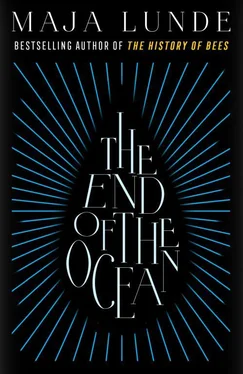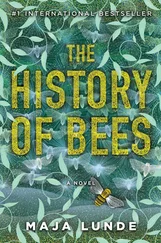The skipper’s nap is also something we have in common, under a blanket on the leeward cockpit bench, five minutes of rest, deep sleep, dropping straight into a dream, before I wake myself up, get onto my knees, look around me for a few seconds—still no boats, no skerries, no obstacles—the seconds I am awake scarcely exist. I sink down on the bench again and am back in the same dream.
The wind and the rushing roar of the ocean become the rumbling of a river. I am beside the River Breio, standing on the bridge, a rough construction of sun-bleached wood. I am young and an adult at the same time, I am just me, the person I have always been, whether I am fifteen, thirty-five or fifty. I am running late for something—a flight, to India, I have to catch a flight to India, I will be in Narmada for months, protesting against the dam they are building, the dam that will put villages underwater, force thousands out of their homes, protesting against the untouchables’ lack of rights. That’s where I’m headed, but before I leave, I have to check my suitcase, make sure I haven’t forgotten anything; it’s by my feet and I try to open it, but the lid is stuck, the suitcase is held together by two straps. I fiddle with them, the leather of the straps is stiff between my fingers, I can’t get them undone and I know the plane is departing soon, that there is only this one flight and then I notice that I’m not wearing shoes, I can’t go all the way from here to the airport without shoes on, maybe there are shoes in the suitcase I can’t open. I lift it, take it with me, walk slowly across the bridge, continue across the site access road, it is full of sharp stones—big, hard stones that cut the skin on the soles of my feet. I pick my way forward, trying to find spots to put my feet, but my progress is slow, I am walking too slowly.
I wake up, look around me, the 360-degree gaze, the coast is clear, but I don’t close my eyes to sleep again, instead I sit up. I am here, but also still there, by the river.
*
I remember a walk, I was maybe nine or ten years old, Daddy and I were on a walk early on a Sunday morning along the River Breio. At first I was so happy, it had been months since we’d spent time together, he didn’t have the time any longer, or the desire. He was too busy arguing with Mommy, yelling at Mommy. Daddy had told me to stop shouting because you can damage your hearing but now he was the one shouting and screaming.
But this morning I was allowed to accompany him. I woke up early and he was already on his way out. He was planning to go alone, he said, but when I pestered him, he gave in and let me come along. It was just the two of us. I think I talked a lot, tried to ask about things we saw, animals and plants, but he gave me single-word answers and I didn’t understand until later that it was because he really didn’t want me with him.
We followed the road along the fjord until we reached a fork. There hadn’t been a fork in the road there before, there had only been a single road, but now it forked into two roads, and one of the roads, the old part, continued along the fjord, while the other followed the River Breio up the mountain.
The road was rough and rocky, with deep ruts from heavy vehicles. It was a temporary road for construction; I hadn’t seen it before, only heard them talk of it, especially him—the access road. He used to spit the words out, as if they had an unpleasant taste.
And it was an ugly road, I could see that now, an ugly, stony road which ruined the landscape it passed through, lined with hard stones, dirty and muddy, it tore the landscape in two.
But this was the road Daddy wanted us to take. He walked without hesitation, long strides and heavy shoes against the ground, shoes that soon were covered in mud and filth.
When we’d walked a short distance up the mountainside he turned to face me and finally he started to talk. But it was like he wasn’t talking to me.
“Aluminum,” he said. That was a difficult word; I wondered if it was written ali or alu or almi , like the word almond —I wondered about this while I listened to Daddy, but he said the word so quickly that I couldn’t distinguish between the sounds.
“Hydraulic power is actually about aluminum , about war, because it’s the aluminum plants that demand an increase in power production and without the production of weapons, eight out of ten aluminum plants would go bankrupt. People think this is about electricity—for schools, daycare centers, hospitals, for people’s homes—but it’s really about weapons and war, Norway’s entire development is based on aluminum and weapons.”
I didn’t know how I was supposed to answer.
We stood there with our heads bowed, looking at the river, and near a particularly powerful waterfall, we saw a rainbow shimmering.
“Roygbiv,” I said.
“What?”
“The colors of the rainbow. Red, orange, yellow, green, blue, indigo, violet.”
“It’s enormous,” Daddy said, and I thought he meant the rainbow, but he was pointing at the river. “It’s the snow from the mountain. The snowfall this year has been extreme. This is the last year we will see the river like that. Next year it will be gone.”
“And the rainbow?” I said.
“That too, you understand that, certainly.”
It was a silly question. I felt suddenly ashamed—I knew that the rainbow was produced by light that was refracted by drops of water, he had explained that to me long ago and I wasn’t one to forget, I stored everything away, especially things he told me.
“But it will still be in the sky,” I said, and hoped it would comfort him. “When it rains while the sun is shining, then we’ll see it, it will appear, like a bridge across the fjord.”
The last thing was something I’d heard him say once and I thought it sounded nice.
He didn’t answer, so I continued, raising my voice.
“You said that, do you remember, Daddy, that God painted the rainbow in the sky as a promise to Noah that he would never again let a flood destroy the world?”
He used to like it, that I told him about things I had learned, that impressed him, but he didn’t answer me now either.
“Do you remember that? And then you asked me what I thought about it. And then I said it was a fairy tale. Because if the story was true, the rainbow would have to be in the sky all the time. Do you remember that I said that? That it was a fairy tale?”
He gave a slight nod.
“Noah didn’t exist,” I said. “The flood didn’t happen.”
He was just as silent.
“THE FLOOD DIDN’T HAPPEN!”
“Good, Signe,” Daddy said finally, but his voice was distant.
Shouting didn’t help. All my life shouting had usually helped, but now it no longer had any effect on him and I didn’t understand why.
The river unfolded before us, a broad piece of fabric that somebody had unwound from a roll of shiny material, I thought, invisible. It could be made into a cloak of invisibility, a freezing cloak of invisibility and maybe that was the one I was wearing now, without knowing it.
Suddenly Daddy started walking again, quickly. I trotted behind him, on the horrible access road, just wanting to go home, but I didn’t dare ask, didn’t dare stop.
Further up the mountainside the road crossed the river by way of a recently constructed bridge that smelled of fresh woodwork, and out on the bridge he finally stopped again and now he looked at me.
“Feel that, Signe, can you feel the water flowing?” he said.
“Yes,” I said.
“Do you feel it?”
“YES!”
The water caused a vibration under my feet, made me shake all over.
“Look around you,” he said. “Everything around you is going to change. A tunnel will be dug here and the water will be diverted away. Down there is where the power plant will be,” he pointed. “And from there they will install enormous power lines. And the river, it will disappear. In the riverbed, where it’s flowing now, there will only be stone.”
Читать дальше










